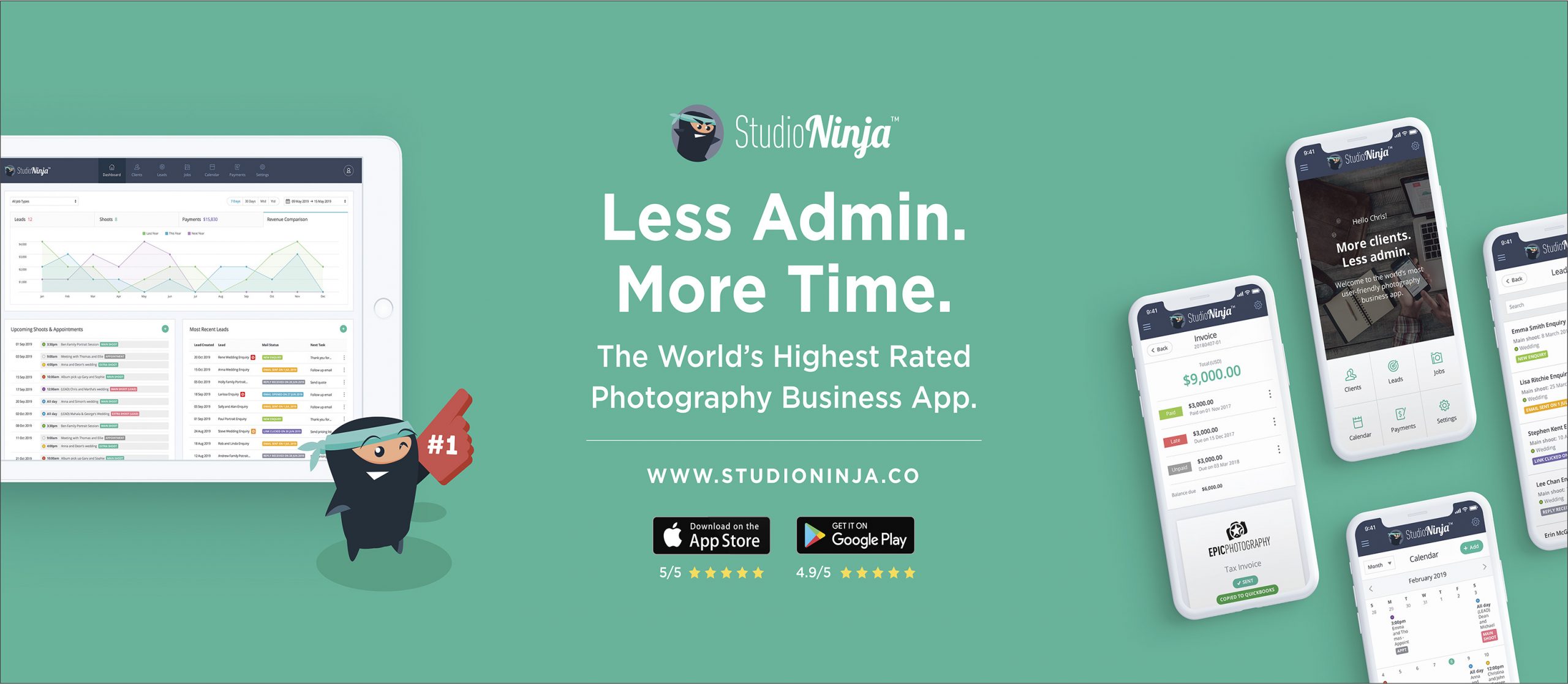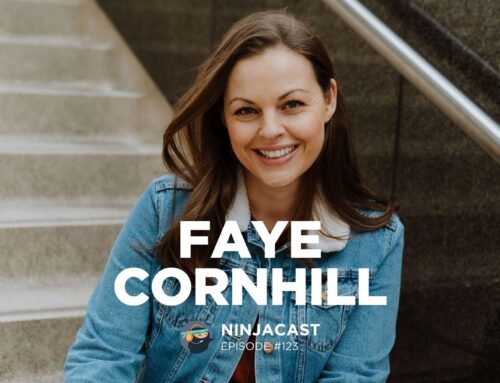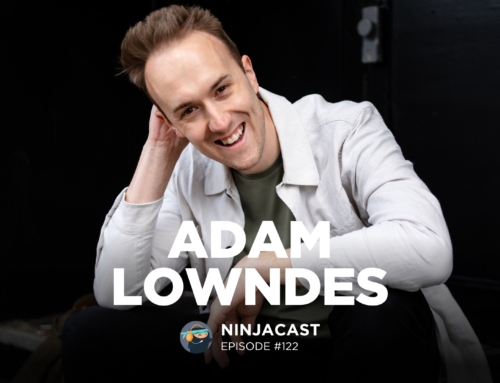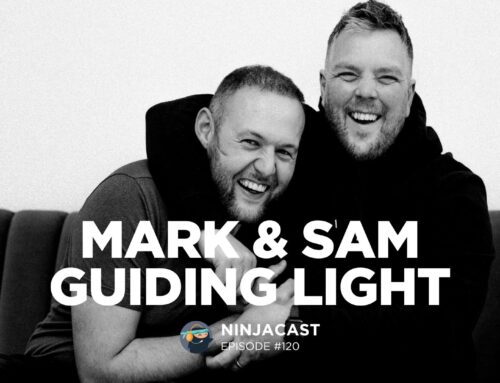058: Studio Ninja Founders – The Past, Present & Future + Top Tips to Streamline Your Photography Business
April 10, 2022
“Don’t be alone – know where to ask for help. “
CHRIS GARBACZ & YUAN WANG
Hey everyone! It’s Sally here, from Studio Ninja. Today’s episode is all about Studio Ninja’s Co-founders; Chris Garbacz & Yuan Wang!
Alongside being co-founders of Studio Ninja, a photography business software and mobile app that has helped thousands of photographers across seventy-two countries, Chris is an award-winning wedding photographer & Yuan is an award-winning art director and user experience designer.
Studio Ninja is now the world’s highest-rated studio management software for photographers & helps you to streamline your business, eliminate paperwork and get your time back. This episode is jam-packed full of lots of top tips to keep your business working whilst you enjoy doing what you love.
Check out some of the biggest points from Chris & Yuan’s interview below:
Chris, could you tell us how the idea of Studio Ninja was born?
So, like I briefly mentioned before, I was always trying to find a side hustle. There was something else I needed to build and all these things kind of failed. And as time went on, I was immersing myself more into podcasts and YouTube videos and audio books about business, about online businesses, about online marketing, about investing, all this sort of stuff. So I guess every day I was feeding myself. I was listening to interviews with other software founders, and all this different stuff. And I was getting ideas all the time, but I specifically remember I was driving at a wedding one day, to the bride’s house,I put on this podcast, and I specifically remember it. It was titled, “How to Start a Software Company With No Money”. And I’m like, “This is interesting. Let’s listen to this one. There could be something here.”
And as soon as this podcast started, I was just so in it and loving it. And I remember arriving to the bride’s house, I’m like, “Damn, why am I here already? I need some more time to finish this podcast episode.” So I remember photographing the bride and doing the bridal coverage, really excited to get back in the car to finish listening to this episode. And then as I was listening to it, the idea literally just came to me at that time, where I’ve been shooting weddings for a long time. I was using a CRM at the time, just to help me manage stuff. But I was just thinking to myself, “The CRM that I am using, it is very good, but I’m only using about 10% of it. There’s a lot of it that I’m not using and actually that other 90% makes it quite complicated for me.” I would log in and it’s cluttered with a lot of stuff that I just don’t need and don’t really look at. So then that’s literally where the idea came from. “Maybe I can build something that’s really, really simple, that’s only 10% of this other product, that’s clean and beautiful and enjoyable to use.” And that was the light bulb moment, literally driving to the ceremony.
So I finished listening to that episode and I got really excited. And in the episode, he detailed how to actually do it. So I got home that night, went to bed, woke up at like five in the morning, and I literally started following the steps of this podcast episode on how to do this thing. So I mocked up some designs. I put together a website for it. I went out to the Facebook groups that I was involved in, and literally just put it out there. I’m like, “Guys, I’m going to build this amazing, awesome CRM, and it’s going to be so cool. And I’m looking for some early adopters. Who’s in with me?”
And luckily, or I don’t know if it’s luck or just the fact that I was involved in those communities, a hundred people jumped on board, and put a little bit of money into the idea. So pretty much once I hit the hundred, two things happened. One, the idea was validated, which is great. It’s proving to me that this business idea has legs. And two, I was absolutely terrified because basically now I have to build this thing that I’ve never even have any experience in whatsoever. God I even remember spending days and days thinking of the business name. I’m like, “What am I going to call this thing? Should I call it Eye Studio, or Studio Cool?” I don’t know. I wrote hundreds of ideas down, and I remember settling on Studio Ninja. I’m thinking, “Oh, ninjas are really cool.” I don’t know. I just loved it. So I settled on that.
Like Yuan said, we would hang out, every couple of weeks, have lunch and just shoot the shit about business. Like, how’s his business going? How’s mine going? Have you got any new ideas in the pipeline? Maybe we can do this. Maybe we can do that. And pretty much over a two year period, it was like, “Bad idea. Bad idea. That’s not going to work. Let’s scrap this one.” So then this one day, I’m like, “Hey Yuan, let’s have lunch. I’ve got this idea and it’s called Studio Ninja and it’s going to be like a photography business app that’s really simple and beautiful.” And he’s like, “Uh-huh.” And then I said, “Well I’ve got a hundred people on board.” And he’s like, “Really?” And we talked about it for quite a while, and at the end, we came to the conclusion where Yuan said, “So Chris, do you actually know how to build this thing?” I’m like, “Yeah, man, it’s cool. I would just put together some stuff and send that off to someone to build.” And he’s like, “Oh man, you’re in trouble.”
So then the next day, Yuan approached me and said, “How about we do this together?” And I’m like, “Oh, maybe he’s got a point. Maybe I don’t know what I’m doing.” I’m good at certain things, but there’s definitely other things that I don’t have skills in, which I know that he has those skills, and I don’t. So we agreed and we teamed up, and Studio Ninja was born. That was in June of 2015.
We spent about seven months building a first version of it, and releasing that to the first hundred people. And again, me floating around in this like fairy land, I thought, “Great, we’re going to put it out there and we’re going to be done.” And it was a disaster, everything went wrong, people couldn’t sign up, things weren’t working. So we spent a bit more time working on it. Yeah, bugs everywhere.
And then we released it to the public in February, and I was really excited to basically retire that day, which sounds stupid and ridiculous but in my head I literally thought I was going to put it out there, and millions of people would come, and I put it out there and one person came. We had one sign up in February. I’m like, “That’s a tough pill to swallow. I thought this was going to be cool and people wanted this thing.” And yeah, we only had one person.
So we kept working. And then in March we had like three sign ups, and we kept working, and we were really close with these people. And then in April we had like eight sign ups, and then it was 15 new sign ups, and then it was 22 and then it was 30 and then 50. I couldn’t even bear to look back at what the product was six years ago. From everything I’d learnt about building, it was, build quickly, get feedback, and then improve, even if the product’s terrible. And it was terrible. But it was so good to get the feedback from these guys early, so that we could make changes quickly and make improvements quickly and release, and get feedback, and make improvements. And every two weeks, every month, we were just constantly working on it. So that’s the backstory for you, Sally. I’m not sure how much of that you really knew, but maybe there’s a bit of insight.
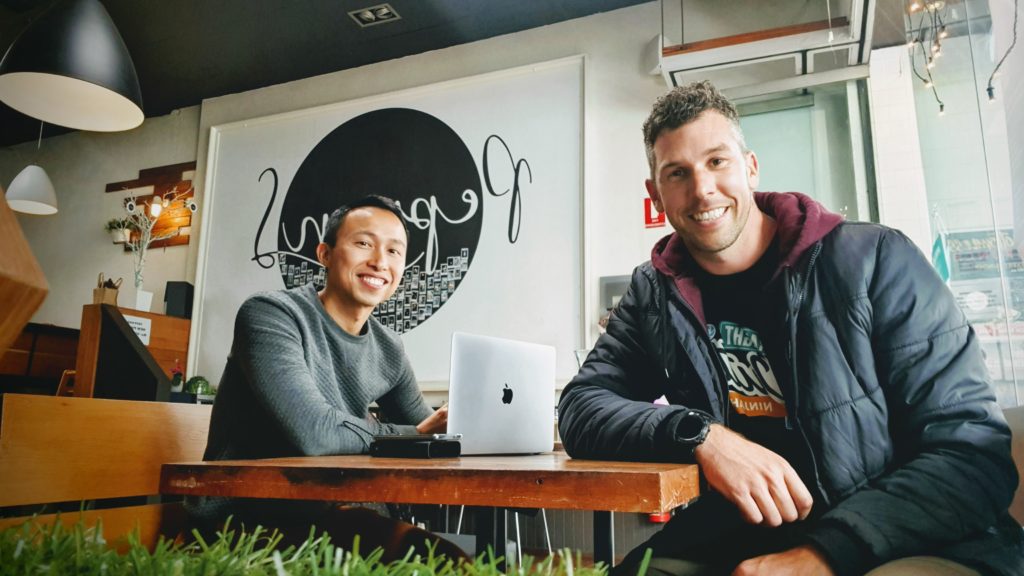
Tell us more about your brand new book – Shoot Like A Ninja?
Yuan:
Yeah, so I’ve always sort of thought, between the two of us, Chris is the photographer, and much more established as a photographer. I kind of just dabble in it, so I wouldn’t even call myself a professional, by any means, but I love photography, and I always thought if I was to be involved in a business, it would dream to mix both design and photography, and that’s what happened with Studio Ninja. Because what we see often is, we do get feedback when users unsubscribe, and one of the biggest reasons that we’ve seen a lot of is that, “My business isn’t working. I’m not earning enough money. I’m not showing enough income for photo photography.”
Yuan:
And seeing a lot of that feedback over time, it made us realize that, “Oh, maybe there’s something there that we’re missing, sspecially given how much we know about business and photography, maybe there’s something here that we could really help our customers in some way.” And I guess getting into education was not really a focus for us, it has always been focused about the product itself, but I thought, “Hey, maybe there’s something here we could, I don’t know, come up with a webinar or a workshop or something, that could help photographers get better in business.” At the same time, I was also going through a business accelerator program, in Sydney, it’s called Key Person of Influence. So it’s run by a company called Dent, and they’re really, really awesome.
Yuan:
It was going through that program, one of the things that they talk about was this idea of writing a book, and that seeded, in my head. That maybe I could … I never saw myself as an author, and I thought, “Maybe we can explore this idea a little bit.” So I came back to Chris and it was like, “Hey, what do you think about writing a book together?” And I think Chris was like, “Oh, I’m not sure that that’s me.” So I think there was an over reluctance on our part to see ourselves as authors. We were like, “Oh, we’re not writers. We’re good at doing what we do, but we’re not necessarily really good at writing.”
Yuan:
And I think going through the program, the idea was to just put your ideas on a paper, forget about the fact that you’re not a good writer or you don’t see yourself as an author, but all you need to do is just put your ideas down on a paper. And I started from at that point, and it was like, just write whatever comes to your mind. It’s literally like a brain dump of what you have in your head. And, I think in about three months, this is going back two and a half years ago, I wrote, I don’t know, 15,000 words, just like a stream of consciousness, about how this book should be structured.
Yuan:
And I think the original idea was to think of three or four steps that a photographer can take, to go from just starting out, to having an established business. What are the things that we can distill down to? And very early on in that process, I guess we came out with this structure that there will be four steps in that. Obviously the book will go into a lot of detail about it, but essentially it is to start with a niche, and then go hard on the marketing, and then work really hard on your conversion, and then eventually you get to streamline and automate a lot of your processes. So that’s the four steps.
Yuan:
So, we did the first draft really quickly in three months, and then literally went, “Oh my God, that is so shit. I’m not going to look at that for a while now.” It’s good to get it out, but it’s so far away from where I think where a book should be. And so literally just put it on the shelf, and not looked at it for two years.
Chris:
COVID happened as well, so that freed up some time. We were on top of things, the engineers were a little bit ahead, and we had a little bit of available time. So we re-dived into it, and I gave into the idea of, “All right, let’s do this.”
Yuan:
Yeah, I think I convinced Chris, I said: “Forget about the book. Why don’t you write it like it’s a webinar, like a presentation, or like a workshop that you’re giving to a photographer. What will be in it?”
Chris:
That’s right. So then I had the same brain dump. I spent three months, every morning waking up, having a cup of coffee, jumping back in bed with my laptop, and just writing for one hour, two hours, three hours, four hours. And it’s interesting, because generally I’m not a writer, I’m not a good writer, and I don’t really enjoy writing, but when you force yourself to do something, I just adapted and it started becoming enjoyable. Literally the hardest part is writing the first sentence, actually sitting there and thinking of the first sentence. And I found once that first sentence came out, just got in flow and just started writing my version of those four steps. And I had actually experienced those four steps, so I was kind of writing my own, not so much my life’s story, but a lot of my own experiences, a lot of my own horror stories actually, as well.
Chris:
And the good thing is with this book, running Studio Ninja, it’s not just my opinion or my idea, we also have access to hundreds, if not thousands, of photographers that we talk to every day, that you talk to as well Sally, really famous photographers, very established photographers, very successful photographers, and we’ve spoken to those people. So the book has ended up being a combination of essentially my horror stories, like everything that went wrong in my career, as well as my wins, in combination with amazing advice and opinions and knowledge, from these other people who are highly successful. And the book’s kind of half comedy, half real blueprint, or just what you have to do, to do well.
Yuan:
I agree. That’s a good reminder, Chris. I actually almost forgot about the part where, even in the early days of writing it, I thought, “I really need to talk to a few really established photographers, to really understand their perspective.” And you see many of these stories in the book, with Scott Johnson, Kristen Cook, Mark Rossetto, Andrew Hellmich and many more. Everyone had really interesting perspectives. It was really enjoyable interviewing them, talking about their experiences, and working all those elements into the book. So, that was actually a big part of the book as well. It wasn’t just my brain dump or Chris’s brain dump, it was also perspectives from many different top photographers who are really, really good at what they do.

If you could add one final piece of advice, something that’s made a difference in your personal life or your business life, what would that piece of advice be?
Yuan:
As I got older, I realized that actually one thing that has really helped me over time is, we all work hard, we all try our best, we all put in a hundred percent, we all have good ideas. But often I find that what’s really helped me was, knowing where to ask for help.
Yuan:
So I’ll get to this point in my career or in my business, where I’ll be like, “I’m stuck. I don’t know how to get any more sales. I don’t know how to get more leads. I’ve hit a plateau of some sort.” One of the first things that I did when I was struggling in business, was hire a business coach. I went through a business accelerator program. And then later on I had a life coach. And it’s not always that I’m doing it constantly, so I’m not doing it weekly, but it’s just at certain points in my career and my business, I thought, “I really need help.” And I talked to someone, even if it’s just for three months, six months, 12 months, it just changed everything. Because suddenly you have this different perspective on how things are working, and you realize that you are not the only person with all these problems. Like, “Oh, okay, I don’t have enough time. I don’t have enough sales. I don’t any leads. I don’t have enough money.”
Yuan:
You realize that actually, there’s thousands of people with the same problems. And there are solutions, and perhaps you can’t see those solutions where you are, but when you have a coach or when you have someone who you can talk to, suddenly they’re like, “Actually the solution is not that hard. Just do one, two, three, four, five things, and in three months time, you’ll be in a much better position.” So I’ve always found, the people who have helped me along the way with their advice and their mentorship, have just been invaluable. And so that’s what I’ll say to any listener. Just ask for help. You just never know.
Sally:
That’s a super piece of advice. Thank you, Yuan.
Chris, how about you?
Chris:
Just to touch on Yuan’s. I guess some photographers or some listeners may think a coach is maybe too … far fetched for them. Sometimes it’s okay just to talk to a friend. Instead of being at home stuck, alone, reach out to a friend who then might introduce you to another friend, and then you get introduced to something. It just kind of gets the ball rolling. I think a coach is absolutely an amazing idea, but sometimes if that may seem too scary for you, I think the point is also, don’t just be alone, just ask for help from anybody, and you’ll be surprised how helpful people are.
Chris:
On my end, I guess I had a few milestone incidences in my life, which I think, looking back in retrospect now, have shaped a bit of my personality or whatever. One is, for a 10 year period in my early twenties, I worked as a disability care worker, part-time, or casually, I guess you could say. So every week, once or twice a week, I would hang out with my friend George, who had a pretty severe disability called spinal muscular dystrophy. Which basically means that over time, your muscles are deteriorating, rather than growing. So I spent a significant amount of my time in my twenties, hanging out with this guy who wasn’t able to get out of bed by himself, wasn’t able to go to the shower by himself. He needed help with everything.
Chris:
But at the same time, he was an incredible man who had his own business. He was consulting, every day he would go to work in the city. We would catch a taxi. He was very well known in the disability sector. People would look to him for advice. He would public speak. He entered a comedy show. He finished his PhD. He did more things than the average person would ever even think about accomplishing. And on top of that, every day I saw him, he was always smiling. Imagine the challenges this guy would have. He would want to go to the library, but he can’t go inside because there’s a step. So it’s like, you’re constantly all day being hit with roadblocks, and yet he was still able to achieve all these things, with a smile on his face.
Chris:
So I kind of just reflect back on that one. If this guy can’t even go to the toilet by himself, unfortunately, but he’s able to achieve all these things, how the F can we really complain about anything? Like I was thinking about myself like, “How can I possibly complain out being hungover, or any stupid irrelevant things in my life.” I think working with him put a really positive spin on my life, and made me really appreciate what we have. That was a big one in shaping some motivation and general positivity.
Chris:
And just another really quick story. I took a year off uni, and I went snowboarding in America, and I actually broke my neck. And it’s a super epic story, which I won’t share with you now, but basically it was a pretty close call. At the time I didn’t even know, so I kept snowboarding on and off. I took some time off uni and literally went from America to Australia to America to Australia, snowboarding back to back, with a fractured C2.
Chris:
So I finally came back, I told my mum about it. She’s like, “We should go to the doctor and check this out. This doesn’t sound very good.” And it turned out I had a broken C2 and needed emergency surgery, which I went into the next day, and it was a close call. And I think having one of these near death experiences puts another perspective on life. It’s like, “Wow, that was a close call. I’m not going to waste anymore of what’s coming up. I’m just going to do the best I can and make the most out of it.”
Chris:
So I think those two experiences played a massive role in my behaviour, and when things fail it’s not the end of the world, I just move on. So I guess my final note would be, on a more positive note, to just remind photographers that they should feel really privileged to be in this career, or whatever career you’re in. I think a photographer, in our case, because we run Studio Ninja, so most of the audience are photographers, but it’s a really, really awesome job. You get to be a part of other people’s lives. It’s a positive experience. You’re out and about. Every day there’s variety. You’ve got interesting challenges. It’s quite lucrative if you do it correctly. I could literally think of a hundred other jobs that would be a million times worse than being a photographer. So I think sometimes it’s nice to have a friendly reminder, that you’re a photographer, it’s an awesome job. Yeah, just appreciate it.
Yuan:
Have fun.
Chris:
Have fun. Yeah!. Just don’t look at all the negativity, there’s so much positivity in this amazing career that you guys have chosen, as the listeners. And yeah, just appreciate and realize how lucky you are to be in this career.
Yuan:
As they say, enjoy the process, enjoy the journey.
Although sometimes you may wake up you’re like, “Oh, I can’t get into it today.” But I think it’s really good reminder to always just enjoy being in it, celebrate the small wins.

Thank you!
Thanks again to you all for joining us and a huge thanks to Chris & Yuan for joining us on the show!
If you have any suggestions, comments or questions about this episode, please be sure to leave them below in the comment section of this post, and if you liked the episode, please share it using the social media buttons you see at the bottom of the post!
That’s it for me this week, I hope you all enjoyed this episode.
See you soon,
Sally

About Chris & Yuan
Alongside being co-founders of Studio Ninja, a photography business software and mobile app that has helped thousands of photographers across seventy-two countries, Chris is an award-winning wedding photographer & Yuan is an award-winning art director and user experience designer. Studio Ninja is now the world’s highest-rated studio management software for photographers & helps you to streamline your business, eliminate paperwork and get your time back. This episode is jam-packed full of lots of top tips to keep your business working whilst you enjoy doing what you love.
